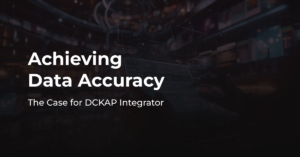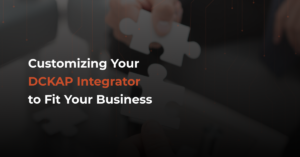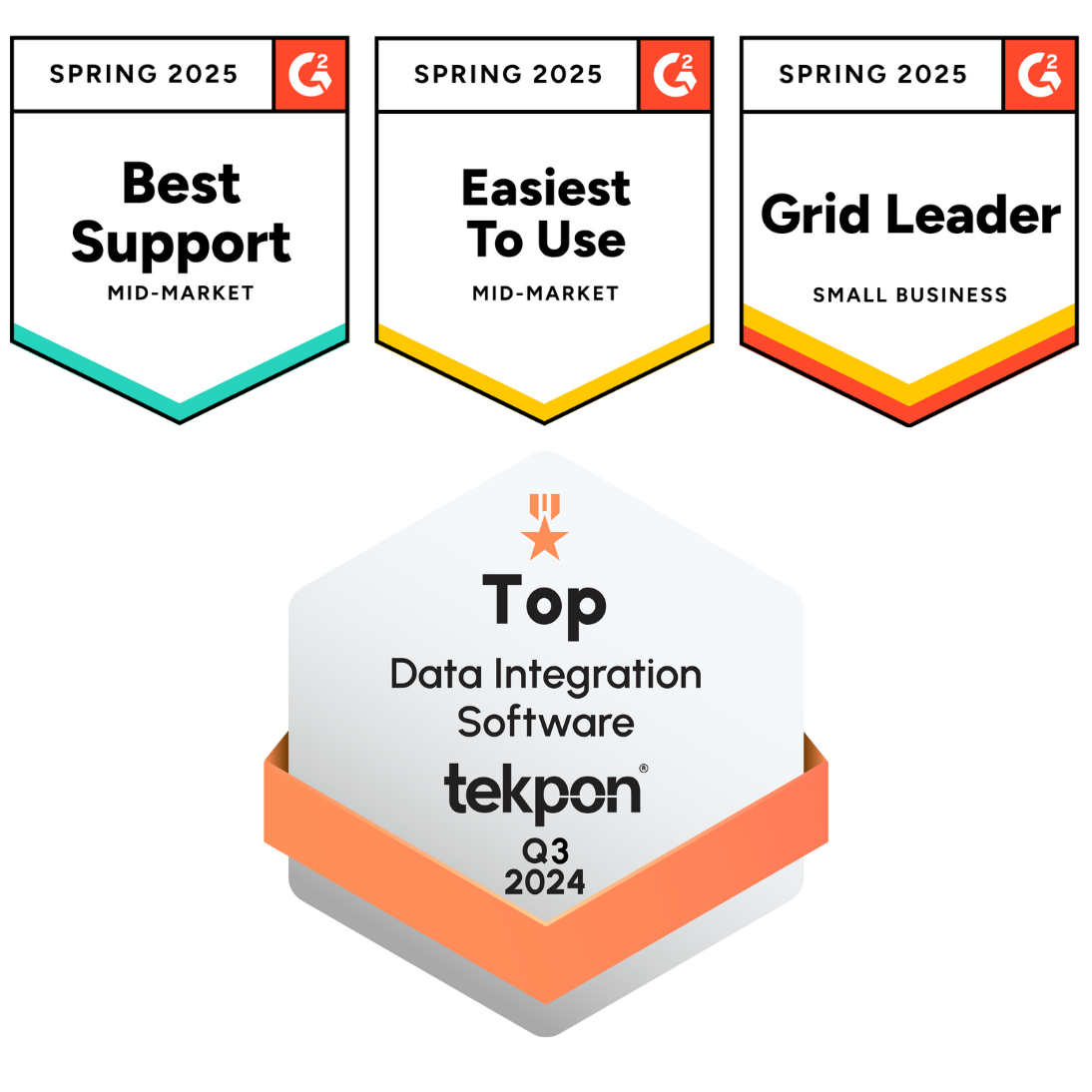The State of Epicor ERP Integrations
July 10, 2025
Executive Summary
This white paper presents key insights from an in-depth analysis of DCKAP Integrator usage across 95 Epicor Enterprise Resource Planning (ERP) customers. Conducted by the DCKAP Research & Solutions Consulting Team, the study focuses on identifying dominant integration patterns, trends, and opportunities, particularly among distributors using Epicor Prophet 21 (P21) and other Epicor and non-Epicor ERP platforms.

The findings highlight that over 77% of Epicor Prophet 21 (P21) integrations involve ecommerce storefronts, reinforcing the ERP’s role as a digital commerce enabler. Additionally, CRM connectivity is growing rapidly, with HubSpot and Salesforce being frequent counterparts. The data also reveals underutilized domains such as PIM, WMS, and payments, representing potential growth areas.
This report is designed for product leaders, IT managers, system integrators, and Epicor stakeholders aiming to better understand distributor behavior and identify opportunities for scalable integration strategies.
Introduction
ERP systems are no longer just back-office tools—they are central to how modern distributors operate and grow. Seamless integration across ecommerce, CRM, and logistics platforms is essential for ensuring real-time visibility and operational efficiency.
This white paper explores how distributors are using DCKAP Integrator with Epicor ERP systems, especially Prophet 21, to build robust commerce tech stacks. It is based on proprietary usage data and aims to help Epicor stakeholders and customers align with emerging integration trends.

Market Context
Distributors face increasing pressure to deliver seamless digital experiences while maintaining operational efficiency. Many rely on Epicor ERP systems like Prophet 21, Eclipse, or Prelude but struggle with complex integration challenges across front-end systems like ecommerce and CRM.

The market needs insights into how integrations are being approached—and where opportunities for simplification, standardization, and innovation exist.
Methodology
The data analyzed in this white paper is derived from the DCKAP Integrator platform, based on integration flows executed by over 50 Epicor Prophet 21 customers and additional flows involving other Epicor and non-Epicor ERP platforms. The Research & Solutions Consulting Team at DCKAP compiled and categorized usage patterns, domains, and systems involved.

Integration Trends & Patterns
77% connect with ecommerce platforms like Magento 2, BigCommerce, Shopify, EvolutionX, and DCKAP Commerce.
15% include CRM tools such as HubSpot, Salesforce, Klaviyo, and Bronto.
Other domains:
- 4% Payment Platform
- 1% Product Information Management (PIM)
- 1% Warehouse Management System (WMS)
- 70% of flows are ecommerce only; 8% include ecommerce + CRM; 3% are CRM-only.
Other Epicor ERP Integrations:
- 100% of flows involve ecommerce and ERP.
- 8% also include CRM or PIM.
Non-Epicor ERPs:
- 89% pair with ecommerce.
- Smaller percentages include CRM (7%), PIM (4%), and WMS (2%).
- ERP-only flows are rare (7%).
Strategic Insights
Digital Commerce First:
ERP-to-eCommerce is the dominant use case, especially for Epicor P21.
CRM Momentum:
P21 has twice the CRM pairing rate of non-Epicor ERPs.
Low Cross-ERP Activity:
P21 is connected with other back-office systems in fewer instances.
Cloud-Native Shift:
Mentions of “P21 Cloud” show growing interest in SaaS-based ecosystems.

Real-World Use Cases
Use Case 1: Epicor Prelude + Magento 2
A distributor integrated Epicor Prelude with Magento 2 using DCKAP Integrator, enabling real-time product updates and order sync, leading to improved customer satisfaction.

Use Case 2: Epicor Eclipse + Shopify + HubSpot
A multi-channel distributor deployed a 3-way integration involving Eclipse ERP, Shopify, and HubSpot to centralize customer data and streamline lead-to-order processing.

Opportunities & Recommendations for ERP Providers

Pre-Built Connectors:
Build or certify reusable integrations for top platforms.
CRM Ecosystem Expansion:
Deepen native support for Salesforce and HubSpot.
Cloud Enablement:
Invest in API-first infrastructure and Integration Platform-as-a-Service (iPaaS) compatibility.
Ecosystem Strategy:
Explore partnerships in PIM, payments, and WMS.
Customer Education:
Promote best-practice architectures to boost adoption.
Final Word
The analysis of DCKAP Integrator usage with Epicor ERPs reveals a strong pattern: distributors are heavily focused on building digital commerce ecosystems. Epicor P21 leads this charge, not just as an ERP, but as a hub for customer-facing technologies.
To stay competitive, Epicor and its partners must invest in integration readiness, build scalable templates, and support the evolving digital needs of modern distributors.

About DCKAP
DCKAP is the ERP-First Integration Platform company that empowers manufacturers and distributors to build, connect, automate, and grow their business. DCKAP Integrator is the ERP Integration platform that connects the ERP system to any number of business applications—including the eCommerce platform, CRM, Inventory, Accounting, Logistics, and Marketplaces like 3M, to name a few.
Ready to make the most of your ERP via integration?
Contact DCKAP’s integration engineers for a consultation.
Learn more about how can DCKAP Integrator support your Epicor integration roadmap and beyond.
Appendix
- ERP: Enterprise Resource Planning
- PIM: Product Information Management
- WMS: Warehouse Management System
- CRM: Customer Relationship Management
- iPaaS: Integration Platform as a Service





